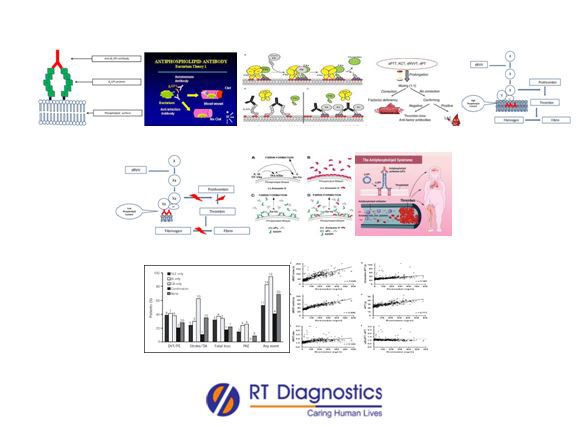Lupus Anticoagulant test:
Why Lupus Anticoagulant Test?
CLINICAL INFORMATION
Phospholipids are important components of cell membranes (phospholipids are found in the outermost layer of the cells). Lupus Anticoagulant (LA) is associated with an immune system disorder known as Anti-Phospholipid Syndrome (APS- a condition that causes frequent blood clots). Lupus anticoagulants belong to a group of antibodies called anti-phospholipids. Antiphospholipid antibodies are a heterogeneous group of autoantibodies directed against glycoproteins in concert with anionic phospholipids. Lupus anticoagulant indicates immunoglobulin (autoantibody) that binds to phospholipids and proteins associated with the cell membrane in a healthy cell (and the term anticoagulant -the term anticoagulant is an inaccurate term. “Here in this context - is a misnomer” (initially it was named so because LA was identified in patients with lupus and moreover it prolonged clotting time), since it is actually a ‘Pro-Thrombotic’ antibody which refers to an increased rate of forming inappropriate blood clots within the living system – in vivo). Causes for LA are certain drugs used as medication such as phenothiazines, phenytoin, hydralazine, quinine, amoxillinetc (i.e drug-induced), a consequence of autoimmune diseases like SLE and autoimmune disorders like Anti-Phospholipid Antibody Syndrome (APS) etc, hereditary causes could be genetically determined (such as anti-cardiolipin antibodies), infections like EBV, syphilis, hepatitis -C etc increases the risk of acquiring lupus anticoagulant. LA or Anti-phospholipids can cause pathologies such as narrowing of blood vessels, formation of blood clots in the heart and brain, reduction in platelet count etc. Complications of LA include the formation of inappropriate blood clots that can lead to DVT, gangrene in the intestines, miscarriages, stroke, ischemia heart attack, pulmonary embolism and other related issues. Symptoms of LA are fever, redness or discolouration along with pain and edema (in arms or legs with numbness), joint pain, rashes, tiredness, chest pain, breathing difficulties, abdominal pain, diarrhoea or bloody stools, pregnancies with repeated miscarriages (usually after the first trimester) and/or pre-eclampsia in pregnant women, low platelets (due to autoimmune thrombocytopenia) etc. LA can also co-exist with other similar associated pathological conditions like Anti-Cardiolipin antibody, Anti-beta 2 Glycoprotein 1, Anti-Prothrombin, False-positive syphilis etc. Lupus Anticoagulant Test is also called as Lupus anticoagulant panel test, Lupus inhibitor test, LA sensitive test, dilute or modified Russel viper venom test etc. This test is used to screen for LA in suspected patients. Since there is no single conclusive diagnostic test for LA. Other additional tests are also required for supporting pieces of evidence for its confirmation. Additional tests include the PTT test, aPTT test, anti-cardiolipin antibody test, beta-2 glycoprotein 1 antibody test, kaolin clotting time, coagulation factor assay tests, and thromboplastin inhibition test, fibrinogen test, VDRL /RPR test, INR test, antithrombin, protein –C, protein –S etc. After the results obtained from additional tests, the confirmation of LA is performed by Hexagonal Phase phospholipid Neutralization Assay. Other tests include CBC, ABI and TBI, angiogram, duplex, duplex ultrasounds, CTA- Computed Tomography Angiography, MRA, CT coronary angiogram, MRI etc.

General Instructions:
Sample Requirement: Specimen - Blood sample collected from the vein. Test Preparation: None.
NOTE - Sample for specimen collections may vary based on the patient’s condition/cases according to the patient’s presenting complaints/signs or symptoms:
SPECIMEN REQUIREMENT (Special or Rare Cases) - As instructed and guided by Physician / Clinician / Pathologist / as per Laboratory’s requirements, according to procedures and protocols.
This Multi-Specialty Clinical Referral Laboratory RT DIAGNOSTICS provides precise and accurate tests with an extensive range of testing services to the medical centres to help in the diagnosis and identification of pathology in the test specimens for infectious diseases and also to evaluate the function of organ systems of the patient. It prevents further complications and helps to stabilize and restore health to near normalcy at the earliest without delay.



